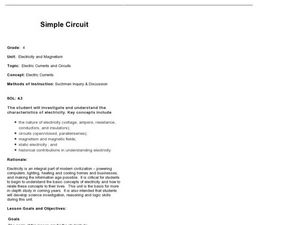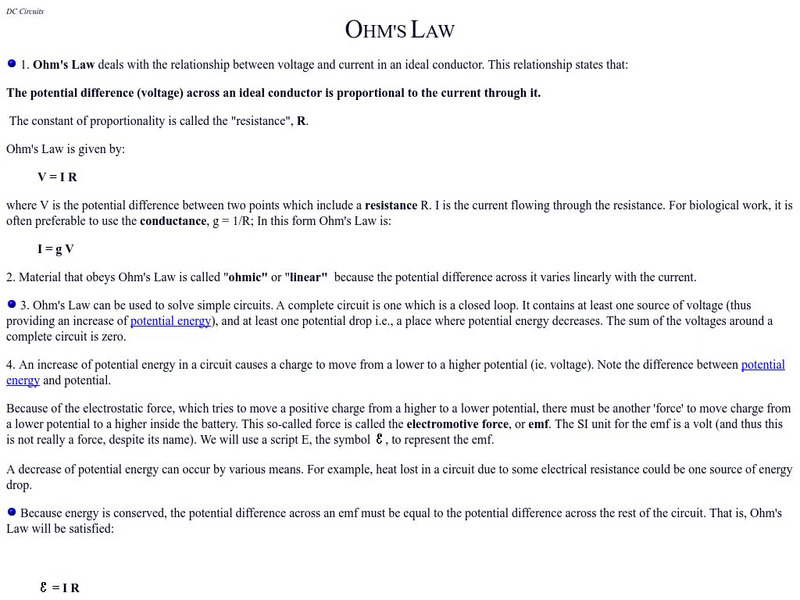Bonneville
Introduction to Circuits
Light up the class's knowledge. Pupils build a simple circuit using a battery, wire, and a light bulb and create a diagram of their circuit. The teacher provides a short lecture on a complete circuit, calling attention to the direction...
Essential Energy
Being a Safety Star (Stage 3)
A spark of static electricity contains up to 3,000 volts, while a lightning strike contains around 3,000,000 volts. To understand electricity, its power, and the safety considerations relating to it learners engage in a comprehensive...
CK-12 Foundation
Resistor Simulation
Many scholars struggle to picture electrons traveling in a circuit but understand water going through a pipe. The simulation compares circuits to water pipes. It walks pupils through four levels of questions, allowing them to switch...
CK-12 Foundation
Capacitor Simulation
The camera flash works based on a simple circuit, but why does it require a capacitor? Scholars work through two levels of simulations related to circuits and capacitors. The pupils first use a simple circuit with a battery,...
CK-12 Foundation
Flashlight
In a simple circuit, does electricity start instantly? A simulation encourages thinking about the flow of electrons at a microscopic level. Pupils control the voltage, resistance, and switch in order to observe the change in both ideal...
Bowels Physics
Electric Circuits
Investigate the construction of the electric circuit with a thorough presentation that provides a solid background for each type of circuit. After introducing key vocabulary, the lesson goes on to explain circuit design.
Curated OER
Simple Circuit: Electric Currents and Circuits
Through inquiry and exploration, 4th graders will learn and understand the functions of open and closed circuits. They will break into 2 groups, define vocabulary, hypothesize how to light a bulb, then test their hypothesis 4 different...
Curated OER
Earth's Energy
Young scholars discuss the Earth's energy. In this science lesson, students construct a simple circuit, a series circuit, and a parallel circuit.
Curated OER
Simply Circuitry and Series Circuit
Students investigate a series circuit. In this physical science lesson, students use a battery, switch, and light bulbs to build an electrical circuit. Students identify the standard symbols being used in electric circuitry.
Curated OER
Simple Circuits
Fifth graders investigate simple circuits and identify when a circuit is considered opened or closed. In small groups, they experiment with wires, batteries, and light bulbs to identify how to light the bulb. Students also experiment...
Curated OER
Solid Conductors
Students work in groups to create a solid conductor testing set up. They use a variety of solid materials and predict if each will serve as a conductor of electricity (allow electricity to pass through so the light bulb will light up)....
Curated OER
Simple Electrical Circuits
Young scholars construct a simple electrical circuit. In this electrical circuit lesson, students use a cell battery, bulb, and wire to construct a simple circuit. Young scholars read about switches, circuits, and electricity in Electro...
Curated OER
Series Circuit
In this series circuit activity, learners observe what happens when they make a simple circuit light more than one light bulb. Students follow 3 directions and answer 3 questions.
Curated OER
Simple Circuit
In this circuits worksheet, students follow directions on how to make a light bulb light and answer questions about it. Students answer 1 question about an insulator and 1 about a conductor.
Curated OER
Let it Shine
Fifth graders investigate concepts of electricity by watching a video about Ben Franklin, participating in a web activity about simple circuits and experimenting with creating simple circuits. They examine conductors and insulators.
Curated OER
What Configurations Work to Light a Bulb?
Students explore simple electrical circuits. Students experiment, using different configurations, to determine what is necessary to compeete a circuit. Students observe similarities between arrangements that work and differences in...
TryEngineering
Try Engineering: Series and Parallel Circuits
The core of this lesson is simple circuits and the differences between parallel and series circuit design. Students perform experiments to test the differences between the two circuit designs using low voltage light bulbs.
University of Colorado
University of Colorado: Ph Et Interactive Simulations: Signal Circuit
Learn how electricity flows through a circuit by watching how the electrons move.
Physics Classroom
The Physics Classroom: Electric Potential Difference
This tutorial is devoted to an understanding of electric potential difference and its application to the movement of charge in electric circuits. Take the interactive quiz to assess your understanding.
University of Guelph
University of Guelph: Physics Tutorials: Ohm's Law
Explains Ohm's Law and some facts related to it.




















